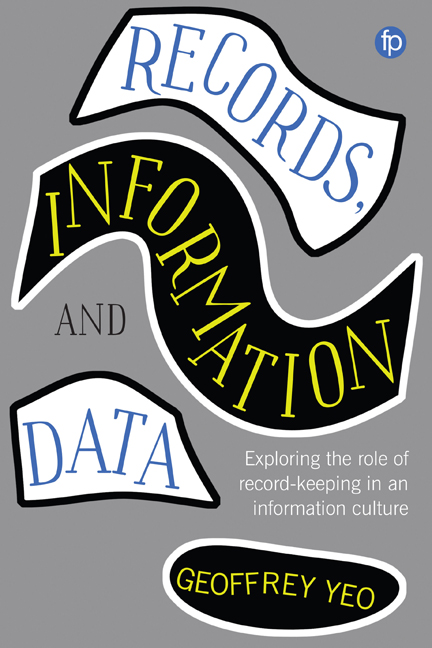Book contents
- Frontmatter
- Contents
- Introduction
- 1 The Making and Keeping of Records: a Brief Historical Overview
- 2 Thinking About Records and Archives; the Transition to the Digital
- 3 Archivists, Records Managers and the Rise of Information
- 4 Finding a Way Through the Hall of Mirrors: Concepts of Information
- 5 Records and Data
- 6 Representation, Performativity and Social Action: Why Records Are Not (Just) Information
- 7 Managing Information or Managing Records?
- Concluding Thoughts: Record-Keeping Present and Future
- Index
5 - Records and Data
Published online by Cambridge University Press: 24 September 2019
- Frontmatter
- Contents
- Introduction
- 1 The Making and Keeping of Records: a Brief Historical Overview
- 2 Thinking About Records and Archives; the Transition to the Digital
- 3 Archivists, Records Managers and the Rise of Information
- 4 Finding a Way Through the Hall of Mirrors: Concepts of Information
- 5 Records and Data
- 6 Representation, Performativity and Social Action: Why Records Are Not (Just) Information
- 7 Managing Information or Managing Records?
- Concluding Thoughts: Record-Keeping Present and Future
- Index
Summary
Introduction
If the writings of contemporary pundits are correct, we live not only in an age of information, but also in an age of data. In literature aimed at the corporate business market, much of the rhetoric that has come to surround concepts of information is often transferred to a parallel discourse about data. We can read, for example, of the importance of efficient enterprise data management, of data governance frameworks and of a need to recognise data as a ‘valuable and manageable organizational asset’ (Bhansali, 2014, 9–10). In the 2010s, organizations have increasingly sought to take advantage of new data analytic techniques to improve decision-making or business activities; many now aim to ‘monetise’ data, exploiting their corporate data in creative ways to become more competitive and profitable (Cohen and Kotorov, 2016; Marr, 2017).
Interest in data analysis and exploitation is not confined to commercial enterprises. Governments, political parties, police forces, scientists and health care providers are all now seeking to analyse digital data to enhance their operations. Data science and data administration, although newly emerging as professions, are rapidly expanding areas of employment in many countries, and the worlds of data analysis and curation have become major fields of research. As Jonathan Furner observed:
There seems to be no doubt that both data science and data studies are here to stay as discrete areas of inquiry. Levels of interest in the development and application of tools and techniques for the analysis of … data are high and constantly rising, as are levels of interest in the study of the sociocultural, political, and economic contexts in
which data is created and used. (Furner, 2015, 369)When European records professionals consider data, they often think of data protection law, whose connections to record-keeping are well established. Records retention, security and privacy must increasingly be addressed in the context of European regulations concerned with trans-border data flows (Montaña, 2016; Sautter, 2011, 25–6). More recently, discussions about data have extended to big data (exponentially growing volumes of analysable data arising from the proliferation of computers across business, government and the wider community), open data (proactive release of public sector data for sharing, redistribution and creative reuse) and other flavours of data that may also appear to be connected with records.
- Type
- Chapter
- Information
- Records, Information and DataExploring the Role of Record Keeping in an Information Culture, pp. 105 - 128Publisher: FacetPrint publication year: 2018



